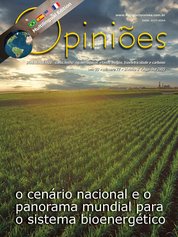Evandro Gussi
Presidente da Unica
OpAA77
Brasil alça voo para o futuro da energia
Tivemos uma experiência bastante exitosa na Índia, país anfitrião da reunião ministerial sobre Transições Energéticas do G20, realizada em julho na cidade de Goa. No momento em que o grupo das maiores economias do mundo lança a Aliança Global para os Biocombustíveis, fortalecendo esses energéticos na mobilidade de baixo carbono, da parte do Brasil, tivemos a grata alegria de acompanhar, em primeira mão, o anúncio do ministro Alexandre Silveira sobre o envio ao Congresso Nacional do Projeto de Lei “Combustível do Futuro”.
A proposta do Ministério de Minas e Energia levará o compromisso com a mobilidade sustentável no Brasil cada vez mais longe, incorporando a avaliação de ciclo de vida (ACV/LCA) como critério de sustentabilidade. O projeto é inovador ao considerar o princípio de neutralidade ou diversidade tecnológica, isto é, não haverá privilégios para qualquer rota, mas o reconhecimento de todas que contribuam para a redução de emissões de CO2.
Nas palavras do ministro Alexandre Silveira, “o Brasil será o primeiro país do mundo a implementar uma política de mobilidade, com base no ciclo de vida do poço à roda dos combustíveis”. Pelo conceito adotado no projeto de lei, a avaliação dos combustíveis irá contabilizar todas as emissões de gases de efeito estufa (GEE), desde o processo de cultivo e extração de recursos à produção dos combustíveis líquidos ou gasosos, ou da energia elétrica, sua distribuição e utilização em veículos leves e pesados de passageiros e comerciais.
Nas palavras do ministro Alexandre Silveira, “o Brasil será o primeiro país do mundo a implementar uma política de mobilidade, com base no ciclo de vida do poço à roda dos combustíveis”. Pelo conceito adotado no projeto de lei, a avaliação dos combustíveis irá contabilizar todas as emissões de gases de efeito estufa (GEE), desde o processo de cultivo e extração de recursos à produção dos combustíveis líquidos ou gasosos, ou da energia elétrica, sua distribuição e utilização em veículos leves e pesados de passageiros e comerciais.
Recebemos essa notícia no seminário Ethanol Talks Special Edition, promovido pela Unica - União da Indústria de Cana-de-Açúcar e Bioenergia, Apla - Arranjo Produtivo Local do Álcool, Ministério das Relações Exteriores e ApexBrasil, em Goa, às vésperas da reunião do G20.
O evento contou com a parceria dos setores automotivo e sucroenergético da Índia, representados pela SIAM - Associação dos Fabricantes de Automóveis Indianos e pela ISMA - Associação Indiana das Indústrias de Açúcar. Também tivemos a honra de receber uma delegação de parlamentares do Senado e da Câmara dos Deputados do Brasil.
Nossos parceiros indianos ficaram impressionados com o fato de o projeto Combustível do Futuro elevar a mistura de etanol dos atuais 27% para 30%, mostrando que o etanol, ao lado de outras soluções, tem um enorme potencial de fazer transição energética eficiente e com baixo custo para a sociedade. É uma medida que certamente colocará o Brasil em outro patamar na almejada transição energética para baixo carbono.
Não é de hoje que a experiência brasileira com o etanol e a bioenergia tem ajudado a transformar a realidade social, ambiental e econômica em países da Ásia e da América Latina. Na Índia, onde estivemos recentemente, os resultados desse trabalho de cooperação, intensificado nos últimos quatro anos, podem ser vistos na rápida evolução da participação do etanol na matriz de transportes indianas.
O percentual de mistura do biocombustível na gasolina saltou de 1,4%, em 2014, para 12% neste ano, com expectativa de atingir 20% em 2025. Além disso, o país iniciou a produção da tecnologia flex fuel em carros e motocicletas. Como sabemos, o setor de transportes é responsável por quase 25% das emissões globais de gases do efeito estufa. E o etanol produzido no Brasil a partir da cana e do milho – convém reforçar – emite até 90% menos CO2 do que a gasolina.
Por isso, a transição para uma mobilidade de baixo carbono passa pela adoção dos biocombustíveis como substitutos aos combustíveis fósseis. E se por um lado temos no Brasil um case de sucesso com o etanol nos veículos leves, por outro, temos a oportunidade de ir muito além de seu uso no presente.
As novas fronteiras apontam para um grande papel dos biocombustíveis no futuro da aviação. O desenvolvimento de SAF (combustível sustentável de aviação) a partir do etanol tem um potencial enorme a ser explorado, e o Brasil e a América Latina podem se tornar o grande centro gravitacional para a produção e distribuição.
Estudo recente do IICA - Instituto Interamericano de Cooperação para a Agricultura - mostra que 65% da descarbonização do setor deve vir do uso de SAF, com previsão de ampliar em 250% a demanda por biocombustíveis.
Por outro lado, podemos produzir biogás e biometano a partir dos resíduos do processamento da cana-de-açúcar. Nos veículos pesados, o biometano atua como substituto do diesel e do gás natural, reduzindo as emissões de CO2 em até 95% se comparado aos combustíveis fósseis. E essa produção começa a ganhar escala no Brasil, inclusive com usina já certificada pelo RenovaBio.
Estamos diante de um horizonte com diversas perspectivas, o que nos remete ao desafio de entender a tendência e como o setor sucroenergético poderá contribuir para o processo. A demanda de bioenergia é global, contudo, ela tem que ser produzida com sustentabilidade e entregue com baixa intensidade de carbono – sem essas características não efetiva descarbonização.
Nesse contexto, o Brasil tem todas as condições de ser um player determinante, sobretudo por sua experiência única no mundo para o desenvolvimento de cadeias de valor destinadas à produção, distribuição e consumo de biocombustíveis. Tenho certeza de que o País está pronto para alçar voos cada vez mais altos, fomentando o caminho da sustentabilidade, especialmente à medida que as instituições públicas e o setor privado atuem na mesma direção.




